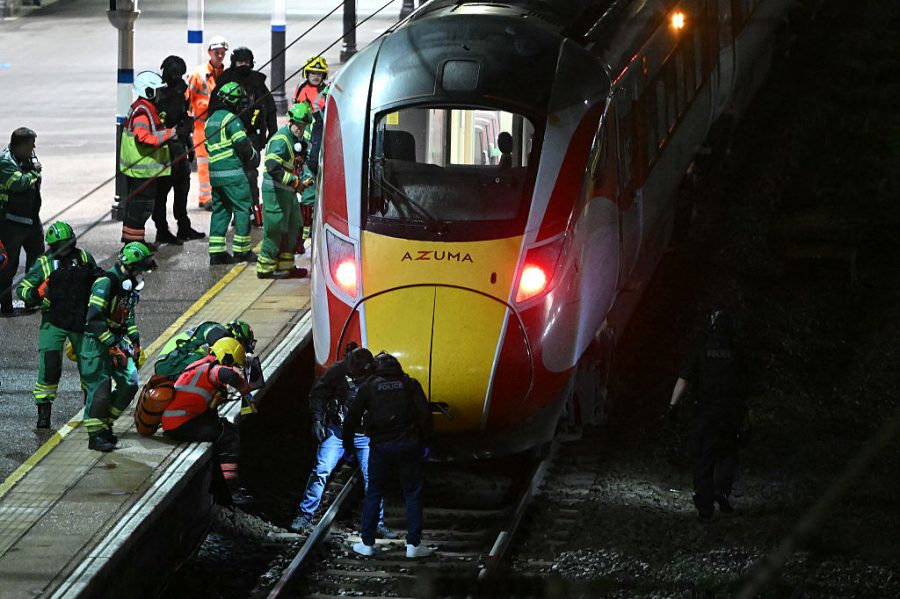The police want us to know one thing about Anthony Williams, the alleged LNER knife attacker. We can only speculate about his motives, his record or whether he was responsible for an earlier attack in the London Docklands. But one fact was broadcast almost immediately: he was British-born.
The police put out a statement soon after arresting him (along with a second man, who was released afterwards):
A 32-year-old man, a black British national, and a 35-year-old man, a British national of Caribbean descent, were both arrested on suspicion of attempted murder. Both were born in the UK.
OK, he was born in the UK. So were three of the four 7/7 bombers. So were the men who murdered Lee Rigby outside Woolwich Barracks. So were the Westminster Bridge and London Bridge stabbing attackers, the perpetrators of the Manchester Arena abomination and, of course, the Southport knife killer, Axel Rudakubana.
I get why the police do their ‘UK-born’ shtick
Are we supposed to be reassured that we bred these monsters ourselves? That our sweet air failed to waft away their violent proclivities? That, despite having grown up in this country, they ended up hating our ways so much that they were prepared to risk their own lives to kill their fellow citizens? Isn’t it alarming to learn that, even if we somehow screwed the immigration tap shut tomorrow, the problem might persist for another generation?
I get why the police do their ‘UK-born’ shtick. They fret that hostility to immigration, especially when recent arrivals commit crimes, might lead to civil unrest. They fear a repeat of the rioting that followed the Southport atrocity, only on a larger scale.
Heaven knows we have plenty of foreign-born criminals, many of whom have claimed asylum here, such as Ahmed Hassan, the Parsons Green bomber and Emad Al Swealmeen, who blew up a taxi outside the Liverpool Women’s Hospital. Jihad al-Shamie, the Manchester synagogue attacker was born in Syria; his father brought the boy with him when he moved here to work as a surgeon.
Yet, without meaning to, the police advertise a deeper problem, one around which there has until now been a taboo. What if violence runs in families? What if a British education does not, in itself, erase generations of aggression, vendetta and honour culture?
Consider Rudakubana, who murdered three little girls with his knife and would have killed more had brave passers-by not intervened. Government sources rushed to tell us that the killer was from Cardiff. It was true, but it gave an incomplete picture. Rudakubana was born to Rwandan parents and had been obsessed with genocide.
Genocide, or at least lethal ethnic conflict, had been the tragic story of Rwanda long before the massacres of 1994. Should we at least consider the possibility that this backstory might have influenced Rudakubana? That, as the old proverb has it, what’s bred in the bone will out in the flesh?
Consider some other ‘UK-born’ terrorist murderers. Three of the four radicals who attacked the London transport network on 7 July 2005, killing 52 people, were British-born sons of Pakistani immigrants. The fourth, Abdullah Shaheed Jamal, had been born in Jamaica as Germaine Lindsay but was brought up in this country, changing his name when he converted to Islam.
Michael Adebolajo and Michael Adebowale, who hacked Lee Rigby to death in 2013, were also UK-born, also the sons of immigrants, and also, technically, Muslim converts. (I say ‘technically’ because their lifestyles, long before the murder, never suggested the slightest Islamic piety.)
The perpetrator of the Westminster Bridge attack, which killed four people and injured just under 50, was Khalid Masood, born in this country as Adrian Russell Elms, of Afro-Caribbean heritage. The unspeakable horror of the 2017 Manchester Arena bomb was carried out by Salman Abedi, born in Manchester to Libyan parents. He, too, was of violent stock – his father had been a member of a proscribed jihadi group – and, he, too, hung on to his resentments throughout an English education.
In attempting to deflect from the number of terror-style attacks carried out by immigrants, the authorities inadvertently emphasise how many are carried out by the sons of immigrants. They may have grown up watching Blue Peter; but they are moved by ancestral voices prophesying war. Accepting that fact is the first step towards getting the right policies on education, assimilation and, indeed, immigration.
We actively need to inculcate a sense of patriotism in all British kids, whether first-generation or fifty-first generation. Our tendency, not only in schools but in many broadcast media, to present our history as a chronicle of racism and exploitation, rather than a story of freedom against the odds, is a big part of our problem.
Equally, though, we should admit that not all immigrants are equal. Some places are more backward and more violent than others. People who come from these places are statistically more likely to commit violent crimes than the children of immigrants from, say, Switzerland. That fact should guide our immigration policy.
Yes, most Brits of immigrant heritage are law-abiding. Most British Muslims reacted with uncomplicated disgust to the Manchester Arena bombing. Most black Brits loathe the knife culture which disproportionately harms their kids. None of that should make us squeamish about stating that certain categories of crime are more frequent among some immigrant communities.
Knife attacks, including random sprees like that on the Cambridgeshire train earlier this month, are sometimes committed by ‘UK-born’ perpetrators. But only in the fantastical world of Netflix are those ‘UK-born’ perpetrators white kids from stable two-parent homes, like the protagonist of the series Adolescence.
Although the government does not release official statistics, a survey by the London Assembly in 2022 found that black Londoners, 13 per cent of the population at that time, had carried out 61 per cent of knife murders. Getting the right policies depends on having accurate data inputs.
We need to stop pretending that all cultures are equal. Importing people from places with belligerent cultures is dangerous, and that danger can persist past one generation. Let’s start by turning off the tap.







Comments